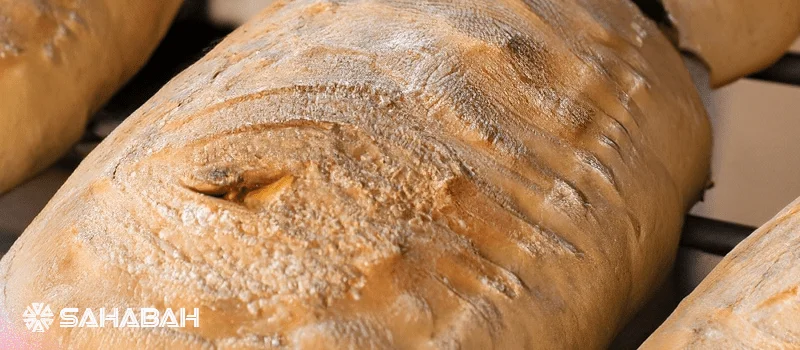This article will analyze these factors in detail to comprehensively evaluate if bread is halal according to Islamic law, so let’s get to know all about bread. Bread is a staple food for many cultures around the world. According to WorldBakers, bread is the second most consumed food globally after rice. An important question arises for Muslims who follow Islamic dietary laws: Is bread halal?
“The term ‘halal’ applies to anything considered permissible according to the teachings of the Prophet (PBUH). It encompasses every aspect of a Muslim’s life including food and drink.”
Foods explicitly prohibited in Islamic law are called haram, meaning unlawful or forbidden.
When evaluating if a food is halal, the following factors must be considered:
- The core ingredients
- How the food is prepared
- Whether it contains any haram ingredients
Ingredients Used in Making Bread
The core ingredients used to make bread include:
- Flour
- Yeast
- Salt
- Water
- Fats or oils
- Sweeteners
- Other minor ingredients
Flour
The most common flour used to make bread is wheat flour.
“Wheat flour is Halal because it is plant-based.”
Other types of flour like rye, oat, barley or multigrain are also halal. As HalalFoundation states:
“Cereal crops and grains such as wheat, rye, barley, oat, etc are halal.”
| Type of Flour | Halal Status |
|---|---|
| Wheat | Halal |
| Rye | Halal |
| Oat | Halal |
| Barley | Halal |
Yeast
Yeast is a microorganism that converts sugar into carbon dioxide and ethanol, causing the bread dough to rise. The use of yeast is controversial among Islamic scholars:
“Yeast is a fungus which acts on the dough to make it rise. This fermentation process has caused a debate among Islamic scholars.”
The main concerns about yeast are:
-
Some Islamic scholars view Yeast as impure since it is a fungus. As HalalIndustryQuest states:
“Yeast is not considered Pak/Pure because it is a fungus.”
-
The fermentation process converts sugars into alcohol (ethanol). As Reddit discusses:
“The process of making bread produces alcohol as a by-product. Some scholars say this makes bread Haram.”
However, most Islamic jurists allow the use of yeast in bread:
-
Yeast is considered pure since it originates from plants. According to IslamQA:
“The yeast used in making bread and other foods is not impure, because its origin is a plant.”
-
The alcohol produced evaporates during baking. FoodIde states:
“Any alcohol produced evaporates when baking the bread, leaving only traces that are permissible under Islamic law.”
So while a minority view yeast as prohibited, most scholars allow yeast breads as halal.
Other Minor Ingredients
Other minor ingredients like salt, sugar, oils, etc. are permissible if from halal sources. As HalalFoundation affirms:
“Minor ingredients and processing aids must also be Halal.”
Some examples of minor ingredients used in bread:
- Salt – Halal in its pure form.
- Sugar – Halal if not from alcohol or pork sources.
- Oils – Halal if from plant sources like olive oil.
- Preservatives – Halal if not from pork or alcohol.
- Emulsifiers – Halal if from plant or halal animal sources.
- Flavors – Halal if not from pork or alcohol.
As HalalHaramWorld summarizes:
“Ingredients like salt, sugar, colors or oils do not have any effect on bread being halal or not as long as they are from halal sources themselves.”
The only exception would be if minor ingredients are derived from pork or intoxicating substances, which are categorically haram according to Islamic law.
To ensure all ingredients are halal, it is best to check for halal certification on commercially made breads. Homemade breads can be made halal by using pure ingredients from halal sources.
Overall, the core ingredients and minor ingredients used in most breads are considered halal, with yeast being the only major exception debated by Islamic scholars.
Bread Manufacturing Process
In addition to the ingredients, the manufacturing process must also be considered when determining if bread is halal. Two main concerns arise regarding commercial bread production:
Use of Equipment
Most commercial bakeries produce both halal and non-halal breads using the same equipment. As HalalHaramWorld explains:
“The equipment used for making bread is usually used for making other non-halal food items as well. So there is a risk of cross-contamination.”
However, IslamQA states:
“Using equipment to make both halal and haram foods does not affect whether bread is halal. Only actual ingredients determine this.”
Alcohol from Fermentation
As mentioned earlier, the fermentation process produces trace amounts of alcohol. However, HalalFoundation affirms:
“Any alcohol produced during fermentation is evaporated when baking, leaving only negligible traces that are permissible.”
So the manufacturing process does not make bread haram according to most scholars.
The issue of alcohol produced during fermentation is debated among Islamic scholars. As QuranRumi discusses:
“A small amount of alcohol is produced as the yeast ferments the dough. Some scholars say that all alcohol is forbidden while others allow small amounts if unavoidable.”
The majority opinion is that the tiny amounts of ethanol produced and evaporated during bread making does not make the bread haram:
-
Alcohol exists naturally in many foods in trace amounts. As Reddit comments:
“There are trace amounts of alcohol in things like fruit juice. Scholars say this does not make foods haram.”
-
The alcohol is not added intentionally but occurs incidentally through a natural process:
“The alcohol produced is incidental and unavoidable, not added intentionally.”
So most scholars agree the manufacturing process does not prohibit bread from being halal. However, some strict interpretations suggest avoiding yeast bread or commercially produced bread if possible.
Halal Status in Islamic Dietary Law
There are diverging opinions among Islamic scholars regarding the halal status of bread:
Majority Opinion: Bread is Halal
The majority of scholars consider most bread to be halal:
-
According to HalalHaramWorld:
“The majority of Islamic scholars agree that bread is halal as long as no haram ingredients are used.”
-
Reasons include use of halal ingredients, purity of yeast, and permissibility of trace alcohol.
-
This includes bread made with yeast through the process of fermentation.
Minority Opinion: Bread Haram
A minority of strict scholars believe yeast breads are haram:
-
As QuranRumi explains:
“Some Islamic schools prohibit baked goods made with yeast, such as bread, as they view the yeast as impure and the fermentation process as forbidden.”
-
Reasons include impurity of yeast and prohibition of alcohol.
-
They suggest making bread without yeast or fermentation.
Uncertain Sources
Bread from unknown or doubtful sources should be avoided:
-
According to DelightedCooking:
“If the halal status or ingredients are unclear, it is better to refrain from consuming the bread.”
So the halal status depends on the interpretation of Islamic law followed.
Is Bread Halal: Are Bread Products Halal Certified or Haram
In conclusion, the majority of Islamic scholars consider bread to be halal based on the following factors:
-
The core ingredients like flour, yeast, salt and water are permitted. According to HalalFoundation:
“The main ingredients used to make bread are considered halal.”
-
The manufacturing process does not make bread haram. As FoodIde states:
“The baking process including use of equipment and any incidental alcohol does not prohibit bread from being halal.”
-
There are some minority opinions prohibiting yeast breads, but the mainstream accepts them.
To be certain, Muslims should check for halal certification on manufactured breads, or bake bread at home using pure ingredients:
“Muslims that want to remain cautious can bake their own bread, and enjoy all the other joys that baking can bring.”
There are also differences based on the school of Islamic law followed. In general, though, most interpretations consider regular bread without illicit ingredients halal.





